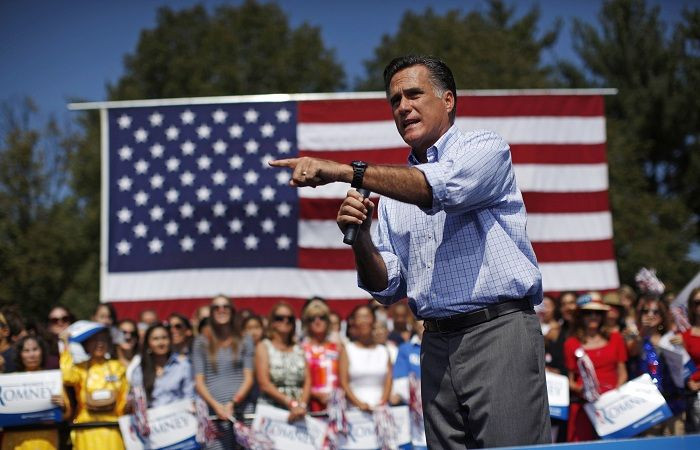Romney Attacks Military Cuts, Appealing To Virginia's Contractors

A harried-looking President Barack Obama gazes out from a lime-green truck that is rolling through Virginia, punctuating Mitt Romney’s Thursday jaunt through the coveted swing state.
“Obama’s defense cuts,” the text on the truck reads, “are threatening over 130,000 jobs in Virginia.”
A press release from the Republican National Committee, topped with the phrase “the Big Fail,” is more explicit.
“Obama’s Sequestration Will Drive Virginia’s Economy ‘Into a Recession,’” the document reads, marshaling several articles in an attempt to link the president to looming military cuts.
It is beyond dispute that a swiftly approaching reduction in the Pentagon’s budget, mandated by the deficit-slimming “super committee” failing to strike a deal, will have dire consequences. Members of both parties have warned of the economic fallout, and a recent report from the White House Office of Management and Budget warned that the looming cuts -- 9.4 percent to defense programs and 8.2 percent to domestic initiatives -- slated to begin in January, would be devastating.
“The Administration does not support these cuts, but unless Congress acts responsibly, there will be no choice but to implement them,” the report says. “No amount of planning can mitigate the significant impact of the sequestration. The destructive across-the-board cuts required by the sequestration are not a substitute for a responsible deficit reduction plan.”
The issue takes on outsize importance in Virginia, home to a vast number of defense contractors reliant on steady flow of Department of Defense dollars and to massive military bases near Norfolk. The sequestration cuts have played a prominent role in the Virginia Senate race, with Republican candidate George Allen taking aim at the planned cutbacks.
“We’re very worried because they are unplanned, they are unprogrammed and it takes a meat axe approach to a budget that’s been worked out over years,” said Peter Steffes, vice president of government policy National Defense Industrial Association. “Virginia is going to be hit as hard as many if not most because we have so much military in the state.”
Romney has sought to tie Obama to sequestration, saying it is an example of the president’s feckless leadership and inability to secure a better deal. (Obama, who during last summer’s debt-ceiling battle had sought a sweeping deficit-reduction bargain with House Republicans, reportedly loathed the sequester deal.)
“It’s unthinkable to Virginia, to our employment needs, but it’s also unthinkable to the ability and the commitment of America to maintain our liberty, with liberty for all,” Romney said during a Sept. 8 appearance in Virginia Beach, citing a Bob Woodward book that suggests the White House came up with the sequestration deal. “And, therefore, if I’m President of the United States, we’ll get rid of those sequestration cuts and rebuild America’s military might.”
But is unclear whether the attacks will help Romney close the gap in Virginia, with polls showing him lagging a few points behind Obama. While Obama ultimately signed the sequester bill, it passed with support from both parties -- including a vote from vice presidential candidate Paul Ryan.
“The sequestration issue is a huge issue in Virginia particularly, but neither side can really get an advantage out of it because both sides agreed to this plan,” said Geoffrey Skelley, a political analyst at the University of Virginia Center for Politics. “It’s been difficult for either side to really get any kind of benefit out of it.”
There’s also the question of how much voters will feel the impact. According to Stephen Fuller, director of the Center for Regional Analysis at George Mason University, the vast majority of federal discretionary funding used to purchase goods and services from Virginia firms flows to Northern Virginia and the Hampton Roads area, where military facilities are concentrated. So, despite the fact that Fuller has estimated the sequester will cost Virginia some 94,000 jobs -- 65,000 of them from a reduction in Dept. of Defense spending -- the loss may not reverberate across the entire state.
“Most Virginians outside of northern Virginia don’t think the federal government is too important to them,” Fuller said. “Since Romney’s going to bring it up, it will get some notice for a little while, but I think it’s an issue that only has traction in the minds of voters as long as it’s present before them.”
Broader concerns like the unemployment rate will more likely predict how Virginians vote, Fuller said. Sequestration is also a complex issue, with plenty of blame to go around -- something that may make it more difficult to convert into campaign ammunition.
“A lot of people understand or have formed an opinion on Medicare,” Skelley said. “Sequestration is more complicated, and people have a more difficult time -- it’s not immediately apparent what these cuts are going to mean unless you work in the industry. It’s still politically difficult.”
© Copyright IBTimes 2024. All rights reserved.





















